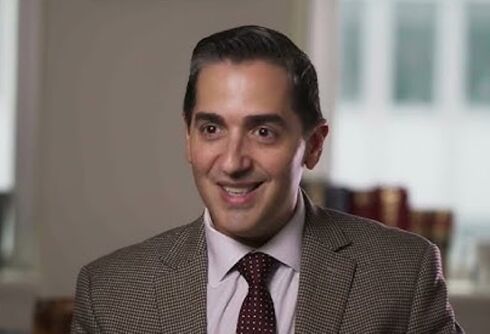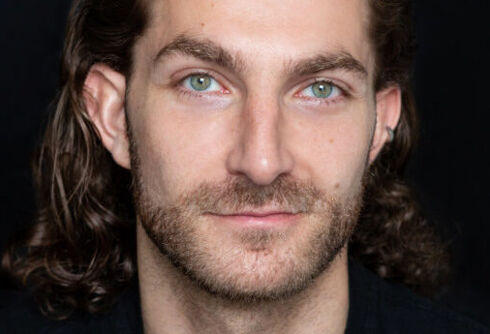On Tuesday, the Supreme Court will hear a series of landmark cases that will have a massive impact on civil rights for the LGBTQ community. Bostock v. Clayton County, Altitude Express Inc. v. Zarda, and R.G. & G.R. Harris Funeral Homes v. EEOC will determine whether anti-discrimination laws as they are currently written in Title VII of the Civil Rights Act of 1964 apply to LGBTQ people.
Among the plaintiffs is Gerald Bostock, who spent over ten years working for Clayton County, Georgia as an advocate for victims of child abuse and neglect. Bostock was abruptly fired by Clayton County in 2013, six months after he joined a gay softball league and subsequently endured homophobic comments from colleagues. When he was let go, his employer cited “conduct unbecoming a county employee” as the reason. Bostock believes his termination was directly related to his sexual orientation.
Related: How much we lose at the Supreme Court will depend on how much we ignore
“I lost my livelihood, I lost my paycheck, I even lost my medical insurance,” Bostock told LGBTQ Nation. “And at the time I was recovering from prostate cancer, so I was devastated.”
Never Miss a Beat
Subscribe to our newsletter to stay ahead of the latest LGBTQ+ political news and insights.
Bostock says he received great performance reviews throughout his time working for Clayton County, and he sees no legitimate reason for his being let go.
“I knew this was wrong,” he said. “I was not going to let this just happen to me with no consequence to Clayton County, so I have pushed and am now hearing my efforts in the Supreme Court for not only LGBTQ workplace discrimination, but workplace discrimination of any form or type.”
Bostock says he is well aware this case is no longer just about him.
“We’re talking about millions of people that go to work fearful of losing their job because of who they are, how they identify, and who they love, and that’s just wrong, and somebody needed to stand up and confront this head on. So I didn’t ask for any of this, but I’ll be the one to do it. Because I don’t want anyone else to experience what I’ve had to experience the last six years of my life.”
Title VII protects employees against discrimination “on the basis of sex, race, color, national origin and religion.” The three cases being heard on Tuesday will ask the Supreme Court to determine whether the word “sex” applies to sexual orientation and gender identity. The plaintiffs and their legal teams will argue that it does, while the employers in all three cases will argue it does not.
Bostock’s case will be heard alongside Zarda V. Altitude Express Inc., a case in which Donald Zarda alleged he was fired from his skydiving instructor job for being gay. Zarda died in 2014, but his estate has continued to pursue his case. R.G. & G.R. Harris Funeral Homes v. EEOC will be heard as a separate case. It involves Aimee Stephens, a transgender woman who was fired from her job as a funeral director two weeks after coming out to her boss.
Bostock’s lawyer, Thomas Mew of Buckley Beal LLP, told LGBTQ Nation that there are three principal arguments they plan to use to win this case. The first, he said, “is the plain language of the Civil Rights Act, itself.” The word “sex” is inextricably linked to sexual orientation.
“A man is only gay if he is a man attracted to other men,” Mew said. “So as a result, any decision based on a person’s sexual orientation is necessarily based on a person’s sex.”
The second argument will refer to a 1989 Supreme Court Case, Price Waterhouse v. Hopkins, in which a majority of the court upheld that gender stereotyping is illegal under Title VII. The decision stated that you can’t fire someone for not conforming to their expected gender roles.
“When an employer discriminates on the basis of an employee’s sexual orientation,” Mew explained. “That is based on how a ‘real man’ or ‘real woman’ should behave, and that’s a form of prohibitive gender stereotyping.”
The third argument, Mew said, will assert that firing someone for their sexual orientation is a form of associational discrimination, as the Civil Rights Act prohibits anyone from being discriminated against for their association with others in a protected class.
It is undisputed that the authors of Title VII were not explicitly thinking of LGBTQ people when they wrote the law. Nevertheless, there is precedent for ruling in favor of what the text actually communicates, rather than what the lawmakers intended.
In the 1998 case Oncale v. Sundowner Offshore Services Inc., the Supreme Court unanimously ruled that same-sex sexual harassment was illegal under Title VII, even though the authors of the law never intended it to mean that.
Justice Antonin Scalia wrote on the case, “Statutory prohibitions often go beyond the principal evil to cover reasonably comparable evils, and it is ultimately the provisions of our laws rather than the principal concerns of our legislators by which we are governed.”
Discrimination against the LGBTQ community may not have been the principal evil addressed in Title VII, but it will be argued on Tuesday that it is certainly a comparable one.
The employers, on the other hand, plan to argue that firing someone for their sexual orientation is not illegal as long as they treat both men and women equally. They will argue that if they would fire both a man and woman for being gay, it is not discrimination.
Mew negated that argument and claimed it is the same one segregationists used to support interracial marriage bans.
“You can’t cure discrimination by doubling down on it,” he said. “That’s not how it works.”
Unless the Supreme Court rules in the plaintiffs’ favor, it will remain legal in 28 states to fire someone for their sexual orientation and/or their gender identity.
The historic nature of these cases has garnered national attention. About three dozen friend-of-the-court briefs have been filed in support of the LGBTQ community, including ones from the American Psychological Association, a group of 150 Members of Congress, an interfaith group of religious organizations, a group of 206 companies that include Facebook, Apple, and Disney, and a group of female C-suite executives.
On the other side, there have been about two dozen friend-of-the-court briefs from groups like the National Association of Evangelicals, the Conference of Catholic Bishops, and the Trump Administration’s Department of Justice.
Many are saying that this case will be a true test of whether the increasingly conservative Supreme Court will rule based on clear textual evidence or whether they will rule based on their party affiliations.
As Tuesday nears, Bostock says he is very excited.
“This has been a long journey,” he said to LGBTQ Nation, “and it is no longer just about me because this impacts so many people. But what this is giving me is the opportunity to paint my own portrait and that’s all I’ve wanted from the beginning. Not to have it painted by somebody else, especially in such a negative light. This gives me the opportunity to clear my name and restore my reputation that was destroyed by Clayton County.”
No matter what happens, Bostock says he pledges to continue fighting for the LGBTQ community, and he hopes his case will help others find the courage to fight back when they are discriminated against as well.
“All we’re seeking here for Gerald is he has his day in court,” says Mew. “He has the opportunity for justice. And of course, justice for Gerald means an opportunity to return to doing what he did so well… serving the community.”
“We’re also aware of the much broader implications of these cases, and our position on that is very simple, that no one should ever face discrimination simply because of who they are and who they love.”
Don't forget to share:














